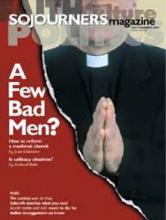I have a question about Jim Wallis' article ("The Sin of Enron," March-April 2002) and a lot of the other ones of its type on the Enron situation, making this a battle in the "rich-poor" class war. Why is it a sin for the Enron executives to sell their shares at the expense of others (no matter who they are) and not a sin for the employees to wish they had had the opportunity to sell their own shares at the expense of others (no matter who they are)?
It has become quite politically correct in our time to excoriate "the rich" (who are now just a couple of working stiffs making $75,000 between them) for wanting to keep what they have earned and to laud the "poor" (working or not) who want to assert a right to what somebody else has earned.
The Enron executives can rightly be charged with theft and the sins of the heart that lead up to that. But what of those who wish they could have done the same thing to some other unsuspecting stock purchaser? The only difference between the two is who got to do what to whom first (as Jesus taught about adultery). Are we really to believe that, faced with losing money in a 401(k) pension plan, the employees would have overcome natural instincts and refused to sell shares that they saw were crashing in value? Who's kidding whom about human nature?
How much money the parties have is immaterial when it comes to naming sin. The problem is not between the rich and the poor—as they are being defined today. The problem is the ancient one of human nature. None are to be fully trusted where the lust for power (gained by politics or money or any other human-made thing) is concerned. As Wallis counsels, read your Bible.
Read the Full Article
